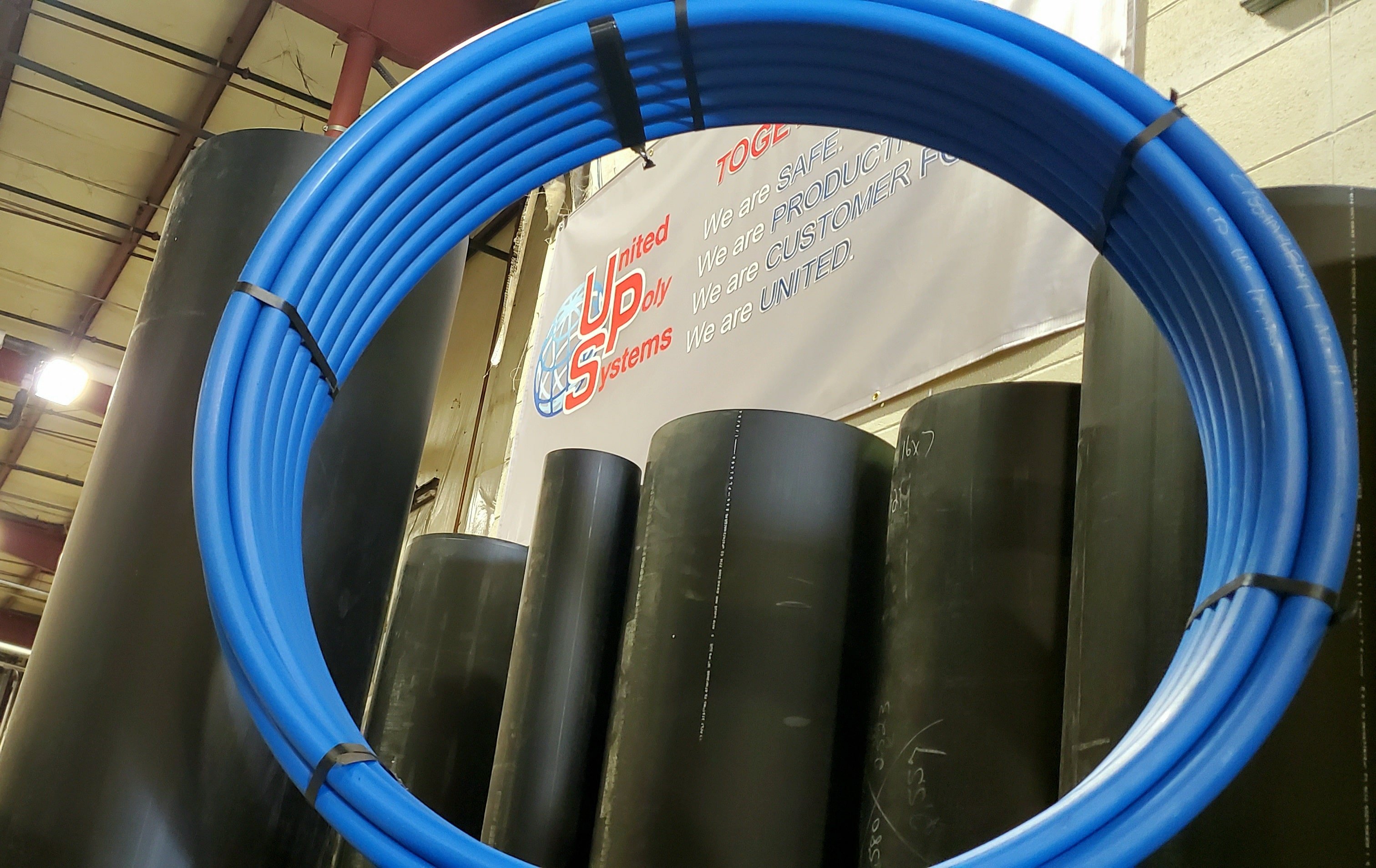The Advancement of American Plastics HDPE Pipe Manufacturing: What You Need to Know
Comprehending the Key Benefits of HDPE Pipeline for Water and Wastewater Administration
Using HDPE pipe in water and wastewater management offers many advantages that warrant consideration. Its exceptional resilience and lengthy life expectancy make it a favored choice for lots of projects. In addition, the material's resistance to corrosion and chemical damages enhances its integrity in different environments. Nonetheless, the benefits expand beyond simply durability and resistance. Exploring its cost-effectiveness and ecological impact exposes a lot more engaging factors for its extensive fostering in modern-day infrastructure
Remarkable Sturdiness and Longevity

HDPE pipe stands out for its phenomenal toughness and long life, making it a preferred selection in water administration systems. Constructed from high-density polyethylene, these pipes can endure substantial stress and tension, guaranteeing reliable performance gradually. Their robust nature enables them to sustain severe ecological problems, including temperature fluctuations and dirt movements, which can trigger other materials to fail.
The lifespan of HDPE pipelines often exceeds half a century, giving a cost-effective solution for districts and sectors alike. Furthermore, the product's light-weight properties streamline setup, minimizing labor costs and durations. This longevity minimizes the need for constant repair services or replacements, better boosting its economic allure.
In water monitoring applications, the integrity of HDPE pipes suggests fewer disruptions and improved solution continuity, making them essential to sustainable facilities growth. The combination of resilience and long life solidifies HDPE's duty as a foundation in reliable water administration remedies.

Resistance to Deterioration and Chemical Damage
While numerous products catch rust and chemical damage gradually, HDPE pipelines exhibit amazing resistance, making them excellent for various water administration applications. This strength stems from the molecular framework of high-density polyethylene, which is naturally non-reactive and does not wear away like metals or deteriorate from exposure to extreme chemicals. Consequently, HDPE is highly effective in environments with aggressive compounds, such as wastewater systems that may consist of acids, bases, and natural solvents.
In addition, HDPE pipelines can endure environmental aspects such as soil level of acidity and saline conditions, further improving their suitability for varied applications (American Plastics HDPE Pipe Manufacturing). Their ability to preserve structural integrity in time minimizes the threat of leakages and failures, which is critical in making certain the safety and reliability of water circulation and wastewater management systems. Subsequently, the resistance to deterioration and chemical damages noticeably adds to the general efficiency and long life of HDPE piping services
Cost-Effectiveness and Economic Benefits
When taking into consideration the monetary ramifications of water administration systems, the cost-effectiveness of HDPE pipelines comes to be evident. These pipelines supply lower installment and maintenance prices contrasted to typical products like steel or concrete. Their light-weight nature simplifies transport and installation, resulting in minimized labor costs. Furthermore, HDPE pipelines show a long life-span, often surpassing 50 years, which converts to less substitutes and long-lasting financial savings.
Moreover, the resistance of HDPE to corrosion and chemical damages lessens the requirement for pricey repair services and substitutes. The pipes additionally sustain effective water flow, decreasing energy costs connected with pumping systems. By alleviating leaks and water loss, HDPE pipes add to considerable financial advantages for municipalities and sectors alike. On the whole, the first financial investment in HDPE piping can produce significant financial returns over the life-span of the water monitoring system, making it a prudent option for lasting facilities development.
Environmental Sustainability and Minimized Impact

Versatility and Adaptability in Installation
Due to their distinct residential or commercial properties, HDPE pipes use impressive versatility and adaptability in installment, making them appropriate for a vast array of applications. Their lightweight nature allows for easier handling and transportation, minimizing labor costs and setup time. HDPE pipelines can be curved and formed to fit different surfaces and job requirements, which is specifically useful in challenging atmospheres.
In addition, their resistance to rust and chemical damage enables for setup in diverse setups without the need for specialized safety finishings. The capability to fuse joints produces a continual, leak-free system, boosting the total honesty and reliability of the installation. HDPE's flexibility additionally fits ground activity, reducing the threat of damage in areas susceptible to moving soil. Overall, these characteristics make HDPE pipes not only versatile however likewise a preferred selection for water and wastewater management systems.
Often Asked Inquiries
Exactly How Does HDPE Pipe Compare to PVC in Water Management Applications?
HDPE pipeline offers exceptional adaptability, resistance to rust, and sturdiness contrasted to PVC. Its lighter weight facilitates much easier installment, while its long life-span reduces replacement expenses, making HDPE a recommended selection in water monitoring applications.
What Is the Life-span of HDPE Pipeline Under Normal Conditions?
Under common problems, HDPE pipelines can have a lifespan varying from 50 to 100 years. Their toughness and resistance to corrosion contribute to their long-term efficiency in different applications, making them a reliable selection for facilities.
Are HDPE Pipes Recyclable After Their Solution Life?
Yes, HDPE pipelines are recyclable after their service life. hdpe pipe fittings Midland TX. They can be processed and repurposed right into new products, substantially lowering ecological impact and promoting sustainability within the market, making them a green selection for piping solutions
What Is the Setup Refine for HDPE Piping?
The installment procedure for HDPE pipelines includes site here preparation, trenching, pipe fusion or mechanical joining, backfilling, and pressure screening. Proper techniques guarantee a resilient and reliable system for delivering water and wastewater efficiently.
Can HDPE Pipes Be Utilized for Both Drinkable and Non-Potable Water Solutions?
Yes, HDPE pipes can be made use of for both safe and clean and non-potable water systems. Their versatility, durability, and resistance to rust make them suitable for various applications, making sure safe and reliable transportation of water in different contexts.